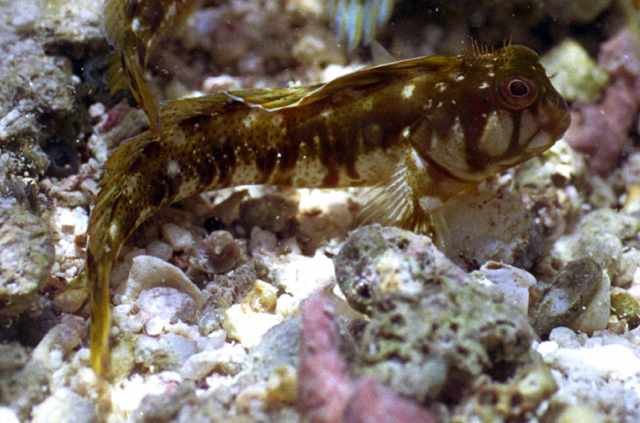| Blenniidae (Combtooth blennies), subfamily: Salariinae |
| 4.7 cm SL (male/unsexed) |
|
demersal; marine |
| Atlantic Ocean, Western South: Fernando de Noronha Archipelago, a volcanic island located 345km off northeastern Brazil. Considered as endemic of the Noronha-Rocas island complex (Ref. 80496). |
|
Dorsal spines (total): 12; Dorsal soft rays (total): 13-15; Anal spines: 2; Anal soft rays: 15-16. Distinguished from its Atlantic congeners by the following combination of characters: a small blue spot on the 2nd dorsal spine (noted mainly in adult males), head with tiny black spots (vs. speckles absent in Scartella cristata), modally 14 segmented dorsal-fin rays (vs. 15 in S. cristata from Brazilian localities, S. caboverdiana, and S. nuchifilis; and 16 in S. springeri), modally 15
segmented anal-fin rays (vs. 16 in S. poiti, 17 in S. cristata from Brazilian localities, S. caboverdiana, and S. nuchifilis; and 18 in S. springeri), and modally 23 caudal vertebrae (vs. 24 in S. cristata from other Brazilian
localities, S. caboverdiana, and S. nuchifilis; and 25 in S. springeri) (Ref. 80496). |
| Collected in shallow-waters and tide pools of the type locality. Similar to its congeners, this species is extremely tolerant to salinity and temperature variations. Some individuals were
also found in small crevices of emerged rocks (2 meters above sea surface), remaining up to 20 minutes out of the water, probably avoiding predators. (Ref. 80496). Similar to its congeners, this species is oviparous. Eggs are demersal and adhesive (Ref. 205), and are attached to the substrate via a filamentous, adhesive pad or pedestal (Ref. 94114). Larvae are planktonic, often found in shallow, coastal waters (Ref. 94114). |
|
Least Concern (LC); Date assessed: 23 March 2011 Ref. (130435)
|
| harmless |
Source and more info: www.fishbase.org. For personal, classroom, and other internal use only. Not for publication.
